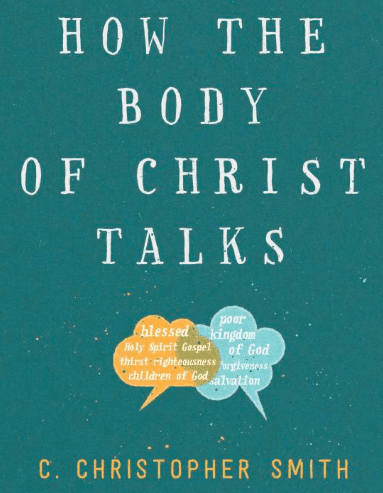 Last week I began a series of posts on C. Christopher Smith’s wonderful new book, How the Body of Christ Talks: Recovering the Practice of Conversation in the Church.
Last week I began a series of posts on C. Christopher Smith’s wonderful new book, How the Body of Christ Talks: Recovering the Practice of Conversation in the Church.
In that post I said this:
The evangelical church’s conversational style can be simplified to the term didactic while the mainline’s approach is dialogical, and Smith and his church are seeking to embody the recovery of conversation as how the church can better be a body.
I’m convinced this form of rhetoric constantly shapes our forms of conversation. Smith begins with a theological rooting of conversation in the Trinity, in what is called “social Trinitarianism.”
In this Trinitarian theology he finds three themes that can help us reshape our conversations: (1) mutual presence, (2) an economy of reciprocity, and (3) diversity. A snippet from each:
Theologians who take a social view of the Trinity often describe the unity of the three divine persons in terms of their “indwelling’ of one another. To say that the persons of the Trinity indwell one another is also to say that they are mutually present to one another. In mutual presence, the persons of the Trinity are fully attentive to one another, speaking and responding out of this complete attentiveness.
Any community will necessarily have an economy, a flow of resources that is an expression of care for its members. Although we would err to say that any person of the Trinity has need of anything, resources are freely shared in the caring triune community that is God.
A crucial tenet in understanding the Trinity, according to orthodox Christian theology, is that “Father, Son, and Holy Spirit are not identical.”7 The Trinity thus consists of three persons bound into one, through their indwelling of one another. We see in the scriptural story that the three persons of the Trinity have distinct roles and functions: the Son took on flesh and lived as a human being in first-century Palestine; the Holy Spirit came among the gathering of Jesus’s followers at Pentecost and continues to abide with and guide God’s people today; the Father, enthroned in the heavens, is the divine mystery, the source of all creation. Yet despite their diversity, the three persons of the Trinity are one, indwelling one another, each bearing witness to the others in their particular work. Indwelling allows the three persons to be bound without coercion; each member remains free.
Conversation among us has analogies due to our being created in God’s image.
As we are learning to talk together, we are learning to be present to one another, to give and receive from one another in the reciprocity of God’s abundant economy, and to be committed to one another despite our diversity. Conversation is difficult for us as human beings. We have been shaped by histories of brokenness: of oppression due to poverty, race, gender, or ethnicity; of the national violence of war or the domestic violence of abuse; of greed that drives both oppression and violence. And these are only a handful of the causes at the heart of our profound brokenness. These histories compel us to withhold our presence from others out of fear—or, on the opposite extreme, to withhold our presence by manipulating others through authoritarian control. These histories incline us to resist sharing ourselves and our resources in reciprocity. They also make it difficult for us to stay committed to others, particularly those who differ from us.











